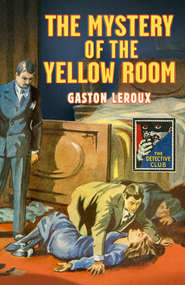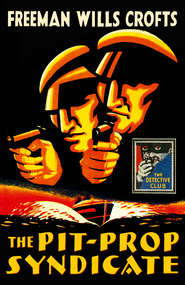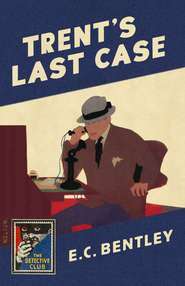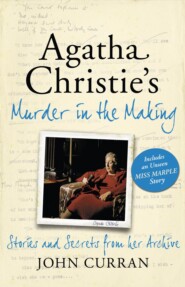По всем вопросам обращайтесь на: info@litportal.ru
(©) 2003-2024.
✖
The Leavenworth Case
Автор
Год написания книги
2019
Настройки чтения
Размер шрифта
Высота строк
Поля
‘But who is it? Who was it that spoke?’
‘That we shall soon see.’ And without waiting to meet, much less answer, my appealing look, he struck his hand against the door, and flung it wide open.
Instantly a flush of lovely colour burst upon us. Blue curtains, blue carpets, blue walls. It was like a glimpse of heavenly azure in a spot where only darkness and gloom were to be expected. Fascinated by the sight, I stepped impetuously forward, but instantly paused again, overcome and impressed by the exquisite picture I saw before me.
Seated in an easy chair of embroidered satin, but rousing from her half-recumbent position, like one who was in the act of launching a powerful invective, I beheld a glorious woman. Fair, frail, proud, delicate; looking like a lily in the thick creamy-tinted wrapper that alternately clung to and swayed from her finely moulded figure; with her forehead, crowned with the palest of pale tresses, lifted and flashing with power; one quivering hand clasping the arm of her chair, the other outstretched and pointing toward some distant object in the room—her whole appearance was so startling, so extraordinary, that I held my breath in surprise, actually for the moment doubting if it were a living woman I beheld, or some famous pythoness conjured up from ancient story, to express in one tremendous gesture the supreme indignation of outraged womanhood.
‘Miss Mary Leavenworth,’ whispered that ever present voice over my shoulder.
Ah! Mary Leavenworth! What a relief came with this name. This beautiful creature, then, was not the Eleanore who could load, aim, and fire a pistol. Turning my head, I followed the guiding of that uplifted hand, now frozen into its place by a new emotion: the emotion of being interrupted in the midst of a direful and pregnant revelation, and saw—but, no, here description fails me! Eleanore Leavenworth must be painted by other hands than mine. I could sit half the day and dilate upon the subtle grace, the pale magnificence, the perfection of form and feature which make Mary Leavenworth the wonder of all who behold her; but Eleanore—I could as soon paint the beatings of my own heart. Beguiling, terrible, grand, pathetic, that face of faces flashed upon my gaze, and instantly the moonlight loveliness of her cousin faded from my memory, and I saw only Eleanore—only Eleanore from that moment on forever.
When my glance first fell upon her, she was standing by the side of a small table, with her face turned toward her cousin, and her two hands resting, the one upon her breast, the other on the table, in an attitude of antagonism. But before the sudden pang which shot through me at the sight of her beauty had subsided, her head had turned, her gaze had encountered mine; all the horror of the situation had burst upon her, and, instead of a haughty woman, drawn up to receive and trample upon the insinuations of another, I beheld, alas, a trembling, panting human creature, conscious that a sword hung above her head, and without a word to say why it should not fall and slay her.
It was a pitiable change; a heart-rending revelation! I turned from it as from a confession. But just then, her cousin, who had apparently regained her self-possession at the first betrayal of emotion on the part of the other, stepped forward and, holding out her hand, inquired:
‘Is not this Mr Raymond? How kind of you, sir. And you?’ turning to Mr Gryce; ‘you have come to tell us we are wanted below, is it not so?’
It was the voice I had heard through the door, but modulated to a sweet, winning, almost caressing tone.
Glancing hastily at Mr Gryce, I looked to see how he was affected by it. Evidently much, for the bow with which he greeted her words was lower than ordinary, and the smile with which he met her earnest look both deprecatory and reassuring. His glance did not embrace her cousin, though her eyes were fixed upon his face with an inquiry in their depths more agonising than the utterance of any cry would have been. Knowing Mr Gryce as I did, I felt that nothing could promise worse, or be more significant, than this transparent disregard of one who seemed to fill the room with her terror. And, struck with pity, I forgot that Mary Leavenworth had spoken, forgot her very presence in fact, and, turning hastily away, took one step toward her cousin, when Mr Gryce’s hand falling on my arm stopped me.
‘Miss Leavenworth speaks,’ said he.
Recalled to myself, I turned my back upon what had so interested me even while it repelled, and forcing myself to make some sort of reply to the fair creature before me, offered my arm and led her toward the door.
Immediately the pale, proud countenance of Mary Leavenworth softened almost to the point of smiling—and here let me say, there never was a woman who could smile and not smile like Mary Leavenworth. Looking in my face, with a frank and sweet appeal in her eyes, she murmured:
‘You are very good. I do feel the need of support; the occasion is so horrible, and my cousin there’—here a little gleam of alarm nickered into her eyes—‘is so very strange today.’
‘Humph!’ thought I to myself; ‘where is the grand indignant pythoness, with the unspeakable wrath and menace in her countenance, whom I saw when I first entered the room?’ Could it be that she was trying to beguile us from our conjectures, by making light of her former expressions? Or was it possible she deceived herself so far as to believe us unimpressed by the weighty accusation overheard by us at a moment so critical?
But Eleanore Leavenworth, leaning on the arm of the detective, soon absorbed all my attention. She had regained by this time her self-possession, also, but not so entirely as her cousin. Her step faltered as she endeavoured to walk, and the hand which rested on his arm trembled like a leaf. ‘Would to God I had never entered this house,’ said I to myself. And yet, before the exclamation was half uttered, I became conscious of a secret rebellion against the thought; an emotion, shall I say, of thankfulness that it had been myself rather than another who had been allowed to break in upon their privacy, overhear that significant remark, and, shall I acknowledge it, follow Mr Gryce and the trembling, swaying figure of Eleanore Leavenworth downstairs. Not that I felt the least relenting in my soul towards guilt. Crime had never looked so black; revenge, selfishness, hatred, cupidity, never seemed more loathsome; and yet—but why enter into the consideration of my feelings at that time? They cannot be of interest; besides, who can fathom the depths of his own soul, or untangle for others the secret cords of revulsion and attraction which are, and ever have been, a mystery and wonder to himself? Enough that, supporting upon my arm the half-fainting form of one woman, but with my attention and interest devoted to another, I descended the stairs of the Leavenworth mansion, and re-entered the dreaded presence of those inquisitors of the law who had been so impatiently awaiting us.
As I once more crossed that threshold, and faced the eager countenances of those I had left so short a time before, I felt as if ages had elapsed in the interval; so much can be experienced by the human soul in the short space of a few over-weighted moments.
CHAPTER VII (#ulink_924497c6-8ad0-584e-ad7b-3ca1344bf55c)
MARY LEAVENWORTH (#ulink_924497c6-8ad0-584e-ad7b-3ca1344bf55c)
‘For this relief much thanks.’
—HAMLET
HAVE you ever observed the effect of the sunlight bursting suddenly upon the earth from behind a mass of heavily surcharged clouds? If so, you can have some idea of the sensation produced in that room by the entrance of these two beautiful ladies. Possessed of a loveliness which would have been conspicuous in all places and under all circumstances, Mary, at least, if not her less striking, though by no means less interesting cousin, could never have entered any assemblage without drawing to herself the wondering attention of all present. But, heralded as here, by the most fearful of tragedies, what could you expect from a collection of men such as I have already described, but overmastering wonder and incredulous admiration? Nothing, perhaps, and yet at the first murmuring sound of amazement and satisfaction, I felt my soul recoil in disgust.
Making haste to seat my now trembling companion in the most retired spot I could find, I looked around for her cousin. But Eleanore Leavenworth, weak as she had appeared in the interview above, showed at this moment neither hesitation nor embarrassment. Advancing upon the arm of the detective, whose suddenly assumed air of persuasion in the presence of the jury was anything but reassuring, she stood for an instant gazing calmly upon the scene before her. Then bowing to the coroner with a grace and condescension which seemed at once to place him on the footing of a politely endured intruder in this home of elegance, she took the seat which her own servants hastened to procure for her, with an ease and dignity that rather recalled the triumphs of the drawing-room than the self-consciousness of a scene such as that in which we found ourselves. Palpable acting, though this was, it was not without its effect. Instantly the murmurs ceased, the obtrusive glances fell, and something like a forced respect made itself visible upon the countenances of all present. Even I, impressed as I had been by her very different demeanor in the room above, experienced a sensation of relief; and was more than startled when, upon turning to the lady at my side, I beheld her eyes riveted upon her cousin with an inquiry in their depths that was anything but encouraging. Fearful of the effect this look might have upon those about us, I hastily seized her hand which, clenched and unconscious, hung over the edge of her chair, and was about to beseech her to have care, when her name, called in a slow, impressive way by the coroner, roused her from her abstraction. Hurriedly withdrawing her gaze from her cousin, she lifted her face to the jury, and I saw a gleam pass over it which brought back my early fancy of the pythoness. But it passed, and it was with an expression of great modesty she settled herself to respond to the demand of the coroner and answer the first few opening inquiries.
But what can express the anxiety of that moment to me? Gentle as she now appeared, she was capable of great wrath, as I knew. Was she going to reiterate her suspicions here? Did she hate as well as mistrust her cousin? Would she dare assert in this presence, and before the world, what she found it so easy to utter in the privacy of her own room and the hearing of the one person concerned? Did she wish to? Her own countenance gave me no clue to her intentions, and, in my anxiety, I turned once more to look at Eleanore. But she, in a dread and apprehension I could easily understand, had recoiled at the first intimation that her cousin was to speak, and now sat with her face covered from sight, by hands blanched to an almost deathly whiteness.
The testimony of Mary Leavenworth was short. After some few questions, mostly referring to her position in the house and her connection with its deceased master, she was asked to relate what she knew of the murder itself, and of its discovery by her cousin and the servants.
Lifting up a brow that seemed never to have known till now the shadow of care or trouble, and a voice that, whilst low and womanly, rang like a bell through the room, she replied:
‘You ask me, gentlemen, a question which I cannot answer of my own personal knowledge. I know nothing of this murder, nor of its discovery, save what has come to me through the lips of others.’
My heart gave a bound of relief, and I saw Eleanore Leavenworth’s hands drop from her brow like stone, while a flickering gleam as of hope fled over her face, and then died away like sunlight leaving marble.
‘For, strange as it may seem to you,’ Mary earnestly continued, the shadow of a past horror revisiting her countenance, ‘I did not enter the room where my uncle lay. I did not even think of doing so; my only impulse was to fly from what was so horrible and heart-rending. But Eleanore went in, and she can tell you—’
‘We will question Miss Eleanore Leavenworth later,’ interrupted the coroner, but very gently for him. Evidently the grace and elegance of this beautiful woman were making their impression. ‘What we want to know is what you saw. You say you cannot tell us of anything that passed in the room at the time of the discovery?’
‘No, sir.’
‘Only what occurred in the hall?’
‘Nothing occurred in the hall,’ she innocently remarked.
‘Did not the servants pass in from the hall, and your cousin come out there after her revival from her fainting fit?’
Mary Leavenworth’s violet eyes opened wonderingly.
‘Yes, sir; but that was nothing.’
‘You remember, however, her coming into the hall?’
‘Yes, sir.’
‘With a paper in her hand?’
‘Paper?’ and she wheeled suddenly and looked at her cousin. ‘Did you have a paper, Eleanore?’
The moment was intense. Eleanore Leavenworth, who at the first mention of the word paper had started perceptibly, rose to her feet at this naïve appeal, and opening her lips seemed about to speak, when the coroner, with a strict sense of what was regular, lifted his hand with decision, and said:
‘You need not ask your cousin, Miss; but let us hear what you have to say yourself.’
Immediately, Eleanore Leavenworth sank back, a pink spot breaking out on either cheek; while a slight murmur testified to the disappointment of those in the room, who were more anxious to have their curiosity gratified than the forms of law adhered to.
Satisfied with having done his duty, and disposed to be easy with so charming a witness, the coroner repeated his question. ‘Tell us, if you please, if you saw any such thing in her hand?’
‘I? Oh, no, no; I saw nothing.’
Being now questioned in relation to the events of the previous night, she had no new light to throw upon the subject. She acknowledged her uncle to have been a little reserved at dinner, but no more so than at previous times when annoyed by some business anxiety.
Asked if she had seen her uncle again that evening, she said no, that she had been detained in her room. That the sight of him, sitting in his seat at the head of the table, was the very last remembrance she had of him.
There was something so touching, so forlorn, and yet so unobtrusive, in this simple recollection of hers, that a look of sympathy passed slowly around the room.
I even detected Mr Gryce softening towards the inkstand. But Eleanore Leavenworth sat unmoved.










